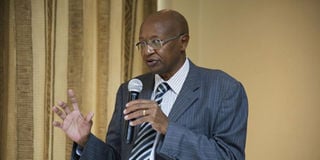The economy is growing, Treasury bosses say

National Treasury Economic Secretary Geoffrey Mwau during a pre-budget briefing in Nairobi on March 23, 2017. PHOTO | DIANA NGILA | NATION MEDIA GROUP
What you need to know:
Dr Mwau downplayed the perception that the growth of the Kenyan economy, which at 6 per cent is double the global average, is not trickling down to the wananchi.
In his State of the Nation address last week, President Uhuru Kenyatta acknowledged the perception that the growth rates don’t resonate with the common people.
Treasury officials have downplayed the perception that despite the much vaunted economic growth, the effects are not being felt by ordinary Kenyans.
At a meeting with journalists ahead of the reading of the Budget statement on Thursday, Treasury Principal Secretary Kamau Thugge and Director of Budget, Fiscal and Economic Affairs Geoffrey Mwau also said Kenyans should not expect tax increases.
Dr Mwau downplayed the perception that the growth of the Kenyan economy, which at 6 per cent is double the global average, is not trickling down to the wananchi.
“If you look at it from the expenditure side, expenditure is growing. In fact, it’s driving our GDP.
"Today, and I’m sure you have seen this, you open a mall like Two Rivers, Kenyans flock there to spend and they have not reduced in Galleria or in any other mall,” he said.
“You can see people spending on the weekends, they are going to Dubai in huge numbers. Kenyans are the second largest visitors to Dubai, other than Indians. Where does this money come from? The middle class is growing,” he added.
LIVING COSTS
Dr Mwau’s analysis is likely to cause debate, given the perpetual complaints about the rising cost of living over the years.
One could also argue that the visitors to Two Rivers Mall could as well be driven there by the curiosity provoked by the numerous advertisements promoting it.
Two weeks after the mall opened, for example, it was reported to have attracted more than 200,000 visitors.
Dr Mwau said the government is aware there is another segment of society that is not doing well, and that is being taken care of through cash transfers and other programmes for easy access to credit.
These would be the Women, Youth and Uwezo funds, through which the government lends small amounts of money to groups considered marginalised for them to invest in their businesses.
Beneficiaries of the cash transfer programme are mostly the aged, who receive an average Sh1,500 per month.
VULNERABLE GROUPS
In the Budget for the coming financial year, for example, the Treasury has asked MPs to approve an allocation of a combined Sh16.6 billion as cash transfers to vulnerable groups – Sh8 billion for orphans and vulnerable children, Sh7.4 billion for elderly people and Sh1.2 billion for the disabled.
The Youth Enterprise Development Fund has been allocated Sh600 million, the Uwezo Fund Sh700 million and the Women Enterprise Fund Sh800 million.
In his State of the Nation address last week, President Uhuru Kenyatta acknowledged the perception that the growth rates don’t resonate with common people.
“Wananchi want to know what these economic indicators mean to their lives. They cannot relate to how GDP impacts on the price of unga, or what the stability of our currency means for them at the end of every month,” he said.
STABLE PRICES
The President said that a combination of the aggressive investment in infrastructure, mostly funded through debt, programmes such as the National Hospital Insurance Fund to reduce the cost of health care and policies to keep the prices of goods stable would, however, have an impact on Kenyans.
Dr Thugge said the long rains, which have started in parts of the country, are expected to lead to a reduction in the inflation rate as food prices fall.
But their failure would not bode well for the country.
“The rains remain a major potential risk for growth prospects,” he added.
The principal secretary was, however, unequivocal in his pledge not to increase the tax burden for Kenyans in the form of an increased Income Tax.
The Treasury’s planned review of income tax has created fears that the rates could be increased.
TAX REDUCTION
“We are not planning to raise income tax and next week, when you listen to the Budget speech, there will be no proposal to increase income tax,” he said.
The Treasury last year increased the tax thresholds and widened the bands, which it said would result in a small reduction in the tax paid by low-income earners.
Dr Thugge and Dr Mwau said Kenya’s growth is being funded by increased revenue collection, which is a result of growth in the Gross Development Product (GDP). It is, after all, all about the economy.
“Just because the economy is growing, every year your revenue is growing by Sh200 billion,” said Dr Thugge.





